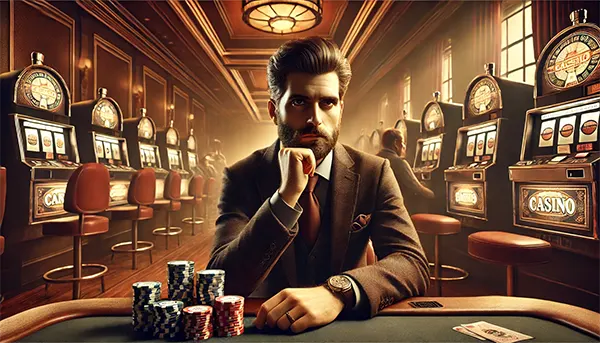
The Psychological Effect of the “Wave of Luck” in Gambling: Why It Can Lead to Major Losses
Gambling has always been a source of emotional highs and lows. One of the most powerful psychological phenomena affecting players is the “wave of luck” effect. This phenomenon creates a sense of invincibility after a streak of consecutive wins but often ends in significant financial losses. In this article, we will examine how this effect works, the psychological mechanisms behind it, and why it can be dangerous for gamblers.
What is the “Wave of Luck” Effect?
The “wave of luck” effect refers to a psychological state in which a player begins to believe that their winning streak will never end. At this moment, emotions override logic, and the individual becomes prone to taking risky actions. This phenomenon is particularly common among beginners who lack experience in managing their emotions while gambling.
While the feeling of euphoria during a “wave of luck” can be exhilarating, it can also cloud judgment and lead to irrational decision-making. Players often fail to acknowledge that gambling outcomes are dictated by random chance, not by their supposed “hot streak.” This misunderstanding drives individuals to bet more aggressively, increasing their exposure to financial risks.
Another aspect of the “wave of luck” is its impact on risk perception. A gambler under its influence tends to underestimate the possibility of losing and overestimate their ability to predict outcomes. This psychological bias leads to a dangerous cycle of escalating bets, as players chase the feeling of success.
Behavioural Aspects of the Phenomenon
Players experiencing a “wave of luck” often disregard statistics and believe that their success is due to “luck.” This leads to exceeding budgets as every subsequent bet feels like a “guaranteed” win.
Behaviourally, the “wave of luck” can result in a lack of discipline. Many gamblers neglect to set limits or ignore pre-established boundaries. This behaviour stems from the false belief that their streak will continue indefinitely. Additionally, this mindset makes it challenging for players to stop gambling, even when losses begin to accumulate.
Some gamblers also exhibit signs of impulsivity, making decisions without fully considering the consequences. This behaviour can escalate the risks, especially when combined with the false confidence that accompanies a winning streak. The emotional highs experienced during a “wave of luck” often overshadow logical thinking, leading to potentially catastrophic outcomes.
Why Can It Lead to Major Losses?
The main danger of the “wave of luck” is that it creates an illusion of control over the game. In reality, no series of wins changes the casino’s mathematical advantage. Ultimately, the player may lose significantly more than they initially planned to spend.
Gambling is inherently designed to favour the house, and the “wave of luck” blinds players to this fundamental truth. This illusion of control often leads gamblers to overextend their resources, believing that their streak signifies skill rather than chance. This overconfidence can result in large, reckless bets that quickly deplete their funds.
Another critical risk is the emotional attachment to winning. Players often equate a streak with personal success, which makes losses feel devastating. This emotional response can trigger desperation, where gamblers attempt to recover their losses by placing even riskier bets, perpetuating a vicious cycle of debt and frustration.
Psychological Mechanisms of Risk
One of the key reasons for losses is a cognitive bias known as the “illusion of control.” The individual overestimates their ability to influence the game’s outcome. Adding to this is the “sunk cost fallacy,” where a player continues to gamble in an attempt to recover previous losses.
Another psychological mechanism at play is the gambler’s fallacy, which leads players to believe that past outcomes influence future results. This misconception reinforces the “wave of luck” by convincing gamblers that their streak will either continue or eventually reverse in their favour. Such thinking drives risky behaviours, ultimately increasing the likelihood of significant losses.
The dopamine rush associated with winning also plays a crucial role. This neurotransmitter reinforces the thrill of gambling, making players crave more. Unfortunately, this chemical reaction can lead to addictive behaviours, where the pursuit of winning overrides logical decision-making, putting the individual at financial and emotional risk.

How to Avoid the “Wave of Luck” Effect?
To avoid the negative consequences of this effect, it is essential to adhere to responsible gambling practices. Players should set clear limits on the time and money they are willing to spend. Additionally, using self-control strategies, such as taking breaks or seeking support from specialists, can be helpful.
Understanding the odds and the randomness of gambling is another effective strategy. Educating oneself on the mechanics of casino games helps dispel myths about winning streaks and reduces the influence of the “wave of luck.” Awareness of these psychological traps empowers players to make informed decisions and maintain control over their gambling behaviour.
Building a support system can also make a significant difference. Friends and family can help keep gamblers accountable and encourage them to adhere to their predetermined limits. Seeking professional advice, such as counselling, can provide tools to manage emotions and mitigate impulsive actions during gambling sessions.
The Role of Education in Prevention
One of the most effective ways to combat the “wave of luck” is to raise awareness among players about the psychological traps of gambling. Understanding how gambling works helps avoid risky decisions and maintain control over one’s actions.
Educational campaigns aimed at promoting responsible gambling can help individuals recognize the signs of the “wave of luck” and take proactive steps to counter its effects. Workshops, online resources, and support groups can equip gamblers with the knowledge and skills needed to gamble responsibly and minimize risks.
Ultimately, fostering a culture of awareness and responsibility within the gambling community is crucial. By addressing the psychological underpinnings of the “wave of luck,” players can enjoy gambling as a form of entertainment without falling into financial or emotional traps.
